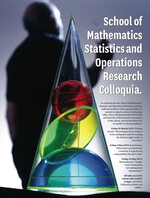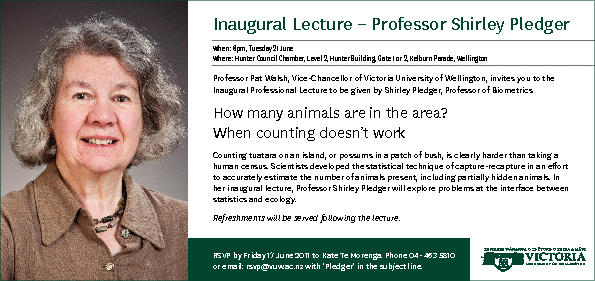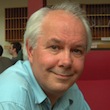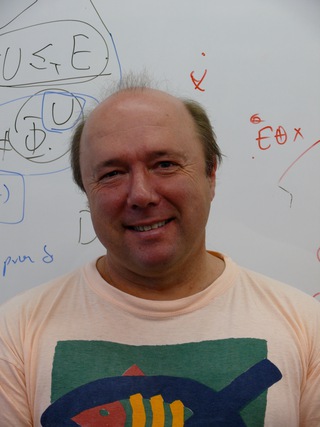News Archive
When does a problem have a solution?
21 Apr 2009 - 13:32 in Event
 Hot on the heels of the first of the MSOR School Colloquium Talks - Richard Arnold 's talk on earthquakes and his election night forecasting, which attracted a large audience - comes the second colloquium talk, this time by Rod Downey. Rod's talk, "When does a problem have a solution: A logician and computability theorist's view", is aimed at a very general audience, and will be accessible to beginning graduate or even advanced undergraduate students.
The talk will be given in the Cotton Club (CO339) at 4pm on Friday May 8th, with refreshments to follow. For more information about the MSOR Research Colloquia, visit http://msor.victoria.ac.nz/Main/MSORColloquia, or click on the link on the left side of this page. A short description of Rod's talk is given below:
Much of mathematics is devoted to giving solutions to equations, calculating solutions to problems, classifying structures according to invariants and the like. Natural questions arise as to when this is not possible. This talk looks at questions such as this tracing, in a idiosyncratic way, a historical line leading to modern incarnations wherein logic allows us to show that no invariants are possible for (e.g.) certain problems in group theory. This is done by showing that normal mathematical structures can be caused to emulate computation in faithful ways.
Hot on the heels of the first of the MSOR School Colloquium Talks - Richard Arnold 's talk on earthquakes and his election night forecasting, which attracted a large audience - comes the second colloquium talk, this time by Rod Downey. Rod's talk, "When does a problem have a solution: A logician and computability theorist's view", is aimed at a very general audience, and will be accessible to beginning graduate or even advanced undergraduate students.
The talk will be given in the Cotton Club (CO339) at 4pm on Friday May 8th, with refreshments to follow. For more information about the MSOR Research Colloquia, visit http://msor.victoria.ac.nz/Main/MSORColloquia, or click on the link on the left side of this page. A short description of Rod's talk is given below:
Much of mathematics is devoted to giving solutions to equations, calculating solutions to problems, classifying structures according to invariants and the like. Natural questions arise as to when this is not possible. This talk looks at questions such as this tracing, in a idiosyncratic way, a historical line leading to modern incarnations wherein logic allows us to show that no invariants are possible for (e.g.) certain problems in group theory. This is done by showing that normal mathematical structures can be caused to emulate computation in faithful ways.
Upcoming MSOR Colloquium
25 Jun 2009 - 11:14 in Event
At 4pm Friday 17 July 2009, in CO339, Dillon Mayhew will present the next MSOR Colloqium: "What is a Matroid?"
Abstract: Matroids are abstract objects that lie just beneath the surface of many naturally-occurring mathematical entities. In this talk I will explain what matroids are, why you should be interested in them, and more particularly, why I am interested in them. The talk will be introductory, and no prior knowledge will be assumed.
Summer Research Scholarships 2014/2015
29 Sep 2014 - 09:40 in Event
Summer Research Scholarships are on offer across the Faculty of Science, including through the Antarctic Research Centre, Robinson Research Institute and Ferrier Research Institute. Some are externally funded and will involve students working with external organisations around Wellington. Applications for the 2014/2015 round are now open, and are due on the 1st of October. For more information please click here
Second MSOR Colloquium Talk this Friday
05 May 2009 - 14:09 in Event
 Hot on the heels of the first of the MSOR School Colloquium Talks - Richard Arnold 's talk on earthquakes and his election night forecasting, which attracted a large audience - comes the second colloquium talk, this time by Rod Downey. Rod's talk, "When does a problem have a solution: A logician and computability theorist's view", is aimed at a very general audience, and will be accessible to beginning graduate or even advanced undergraduate students.
The talk will be given in the Cotton Club (CO339) at 4pm on Friday May 8th, with refreshments to follow. For more information about the MSOR Research Colloquia, visit http://msor.victoria.ac.nz/Main/MSORColloquia, or click on the link on the left side of this page. A short description of Rod's talk is given below:
Much of mathematics is devoted to giving solutions to equations, calculating solutions to problems, classifying structures according to invariants and the like. Natural questions arise as to when this is not possible. This talk looks at questions such as this tracing, in a idiosyncratic way, a historical line leading to modern incarnations wherein logic allows us to show that no invariants are possible for (e.g.) certain problems in group theory. This is done by showing that normal mathematical structures can be caused to emulate computation in faithful ways.
This news item is a repeat of an earlier reminder about Rod's talk.
Hot on the heels of the first of the MSOR School Colloquium Talks - Richard Arnold 's talk on earthquakes and his election night forecasting, which attracted a large audience - comes the second colloquium talk, this time by Rod Downey. Rod's talk, "When does a problem have a solution: A logician and computability theorist's view", is aimed at a very general audience, and will be accessible to beginning graduate or even advanced undergraduate students.
The talk will be given in the Cotton Club (CO339) at 4pm on Friday May 8th, with refreshments to follow. For more information about the MSOR Research Colloquia, visit http://msor.victoria.ac.nz/Main/MSORColloquia, or click on the link on the left side of this page. A short description of Rod's talk is given below:
Much of mathematics is devoted to giving solutions to equations, calculating solutions to problems, classifying structures according to invariants and the like. Natural questions arise as to when this is not possible. This talk looks at questions such as this tracing, in a idiosyncratic way, a historical line leading to modern incarnations wherein logic allows us to show that no invariants are possible for (e.g.) certain problems in group theory. This is done by showing that normal mathematical structures can be caused to emulate computation in faithful ways.
This news item is a repeat of an earlier reminder about Rod's talk.
Rod Downey at Royal Society Science Forum
05 May 2009 - 15:40 in Event
Professor Rod Downey was invited to take part in the Royal Society's Speakers Science Forum on Tuesday 5 May 2009 at Parliament Buildings..
Every year, the Royal Society of New Zealand runs a series of short science talks for Members of Parliament, under the auspices of the Speaker of Parliament. The series runs from March to June on selected Tuesday nights. It is timed to fit within MP's dinner hour. Each session concludes with a light buffet dinner before MPs go back into session.
Rod Downey on Alan Turing
12 Mar 2015 - 11:37 in Event
Rod Downey, one of the world’s leading experts on the theory of computation and a Professor in the School of Mathematics, Statistics and Operations Research, has been talking about the work of computing pioneer and Bletchley Park code-breaker extraordinaire Alan Turing.
An interview with Rod on Alan Turing’s life, work and influence, as well as his portrayal in the recent movie 'The Imitation game’, is to be aired on Our Changing World at 9pm on Thursday 12 March. A longer audio version of the talk is available at: http://www.radionz.co.nz/national/programmes/ourchangingworld
In February, Rod also gave a public lecture 'Alan Turing, Computing, Bletchley and Mathematics’. A recording of the talk is available here
Slides accompanying the lecture are also available at http://homepages.ecs.vuw.ac.nz/~downey/turing_15.pdf
Prof Shirley Pledger's Inaugural Lecture
13 Jun 2011 - 10:49 in Event
Keeping count of our species
Just how bad is the plight of native frogs? How are kakapo or tuatara doing?
A Victoria University professor has used statistical techniques to estimate numbers in animal populations, providing accurate data that are essential to conservation efforts.
Professor Shirley Pledger, an international expert in this area, will explore how statistics has helped conservation in her inaugural professorial lecture at Victoria University next Tuesday.
Her research has built on the 'capture-recapture' method used by scientists.
"Capture-recapture is a technique that provides accurate estimates of animals, including any that remain hidden," says Professor Pledger. "It gives us data so we know what we're dealing with. For instance, do we need to concentrate more on removing predators? Where are numbers strong?"
Using the technique, scientists capture a sample of animals, mark them then release them. Later they capture another sample and use the proportion of marked animals that are recaptured to estimate the total animal population.
Professor Pledger's research has focused on improving the capture-recapture method, trying different models to accurately estimate the numbers of animals.
"Some animals are bold, some shy, some move around. Scientists either surveyed 'closed' populations, which is a kind of snapshot, or 'open' populations over a length of time that saw births, deaths and migrations. The outstanding problem for 20 years or so was that most surveys typically underestimated population sizes - now that's much less of an issue."
As well as working with biologists at Victoria and other institutions in New Zealand, Professor Pledger has strong international connections.
Her statistical work forms part of a US computer package for surveying animal populations.
Vice-Chancellor Professor Pat Walsh says Victoria's inaugural lecture series is an opportunity for professors to provide family, friends, colleagues and the wider community with an insight into their specialist area of study.
"It is also an opportunity for the University to celebrate and acknowledge our valued professors," says Professor Walsh.
Inaugural lecture - Professor Shirley Pledger
'How many animals are in the area? When counting doesn't work'
Tuesday 21 June, 6pm
Hunter Council Chamber, Level 2, Hunter Building
Victoria University, Kelburn RSVPs essential - please email rsvp@vuw.ac.nz with 'Pledger' in the subject line or call 04 463 5810 For more information, please contact Professor Shirley Pledger on 04 463 6788 or email shirley.pledger@vuw.ac.nz
Invitation (click image below for a pdf)
Inaugural lecture - Professor Shirley Pledger
'How many animals are in the area? When counting doesn't work'
Tuesday 21 June, 6pm
Hunter Council Chamber, Level 2, Hunter Building
Victoria University, Kelburn RSVPs essential - please email rsvp@vuw.ac.nz with 'Pledger' in the subject line or call 04 463 5810 For more information, please contact Professor Shirley Pledger on 04 463 6788 or email shirley.pledger@vuw.ac.nz
Invitation (click image below for a pdf)

Popular math writer to speak in Wellington
19 Sep 2013 - 12:42 in Event
 The author of numerous books which have popularised mathematics to general audiences around the world will give a public lecture at Victoria University in early October.
The talk by Professor Ian Stewart, Emeritus Professor of Mathematics at the University of Warwick, is titled Equations that Changed the World and will reveal the extent to which civilisation depends, and has depended, on a small number of important mathematical equations.
Professor Stewart is one of the world’s best-loved writers on maths, having published more than 80 titles.
This includes books such as Does God Play Dice, an exploration of chaos theory, a range of books on mathematical puzzles, curiosities and conundrums, the number one best seller 17 Equations That Changed the World, and collaborations with the science-fiction writers Terry Pratchett and Jack Cohen.
He has won many awards for furthering the public’s understanding of science including, in 2008, the Zeeman Medal of the Institute of Mathematics and its Applications and the London Mathematical Society, the first medal specifically given to a mathematician in the United Kingdom for promoting maths to the public.
Professor Stewart’s Wellington lecture, at 5.30pm on Friday 4 October, will highlight how we rely on equations every day, when using things like mobile phones, the internet, electronic car navigation systems and digital cameras.
Despite being about equations, Professor Stewart says the audience will not need technical knowledge and the lecture will use plenty of pictures.
In 1997, Professor Stewart held the prestigious Forder Lectureship, an arrangement between the London and New Zealand Mathematical Societies under which a prominent United Kingdom mathematician tours New Zealand, giving lectures at major universities, including Victoria. Professor Stewart has also made a number of private visits to New Zealand in recent years.
In addition to giving a public lecture, he will be attending, and speaking at, the New Zealand Association of Mathematics Teachers conference in Wellington.
RSVP not necessary.
Professor Stewart’s lecture will take place on Friday 4 October , 5.30 – 6.30pm in Rutherford House Lecture Theatre 1, Pipitea Campus, Victoria University.
To request an interview with Professor Stewart, contact Communications Manager Katherine Edmond on 04 463 6017, 027 563 6017 or katherine.edmond@clear.net.nz
To find out more about Professor Stewart’s work, visit: http://freespace.virgin.net/ianstewart.joat/index.htm
_______________________________________________________________________________________________________________
Issued by Victoria University of Wellington Communications & Marketing. Katherine Edmond, Communications Manager, can be contacted by emailing katherine.edmond@clear.net.nz or phoning (04) 463 6016 or 027 563 6017.
Victoria University of Wellington: New Zealand’s most research-intensive university.
The author of numerous books which have popularised mathematics to general audiences around the world will give a public lecture at Victoria University in early October.
The talk by Professor Ian Stewart, Emeritus Professor of Mathematics at the University of Warwick, is titled Equations that Changed the World and will reveal the extent to which civilisation depends, and has depended, on a small number of important mathematical equations.
Professor Stewart is one of the world’s best-loved writers on maths, having published more than 80 titles.
This includes books such as Does God Play Dice, an exploration of chaos theory, a range of books on mathematical puzzles, curiosities and conundrums, the number one best seller 17 Equations That Changed the World, and collaborations with the science-fiction writers Terry Pratchett and Jack Cohen.
He has won many awards for furthering the public’s understanding of science including, in 2008, the Zeeman Medal of the Institute of Mathematics and its Applications and the London Mathematical Society, the first medal specifically given to a mathematician in the United Kingdom for promoting maths to the public.
Professor Stewart’s Wellington lecture, at 5.30pm on Friday 4 October, will highlight how we rely on equations every day, when using things like mobile phones, the internet, electronic car navigation systems and digital cameras.
Despite being about equations, Professor Stewart says the audience will not need technical knowledge and the lecture will use plenty of pictures.
In 1997, Professor Stewart held the prestigious Forder Lectureship, an arrangement between the London and New Zealand Mathematical Societies under which a prominent United Kingdom mathematician tours New Zealand, giving lectures at major universities, including Victoria. Professor Stewart has also made a number of private visits to New Zealand in recent years.
In addition to giving a public lecture, he will be attending, and speaking at, the New Zealand Association of Mathematics Teachers conference in Wellington.
RSVP not necessary.
Professor Stewart’s lecture will take place on Friday 4 October , 5.30 – 6.30pm in Rutherford House Lecture Theatre 1, Pipitea Campus, Victoria University.
To request an interview with Professor Stewart, contact Communications Manager Katherine Edmond on 04 463 6017, 027 563 6017 or katherine.edmond@clear.net.nz
To find out more about Professor Stewart’s work, visit: http://freespace.virgin.net/ianstewart.joat/index.htm
_______________________________________________________________________________________________________________
Issued by Victoria University of Wellington Communications & Marketing. Katherine Edmond, Communications Manager, can be contacted by emailing katherine.edmond@clear.net.nz or phoning (04) 463 6016 or 027 563 6017.
Victoria University of Wellington: New Zealand’s most research-intensive university.
Peter Donelan speaks to Kim Hill about Fractals
01 Nov 2010 - 14:49 in Event
Peter Donelan did an interview with Kim Hill on Saturday 23 October about fractals and Benoit Mandelbrot. If you'd like to listen go to the
Radio New Zealand webpage or click here for the podcast
New SMSOR School Website
12 May 2010 - 10:01 in Event
The School of Mathematics, Statistics and Operations Research has a new look website.
Prospective students, and students planning the next steps in their degrees, should look at pages under the "Study" tab - and should keep an eye on the Scholarships page for funding opportunities for further study.
Prospective Masters and PhD students should have a look at the list of possible thesis topics and supervisors.
Currently enrolled students can find course homepages for courses that are running now under the "Current Students" tab.
Staff and graduate students needing statistical advice can contact the statistical consultant, Dalice Sim. A link to further information is in the "Information About..." set of links on the right hand side of the page.

